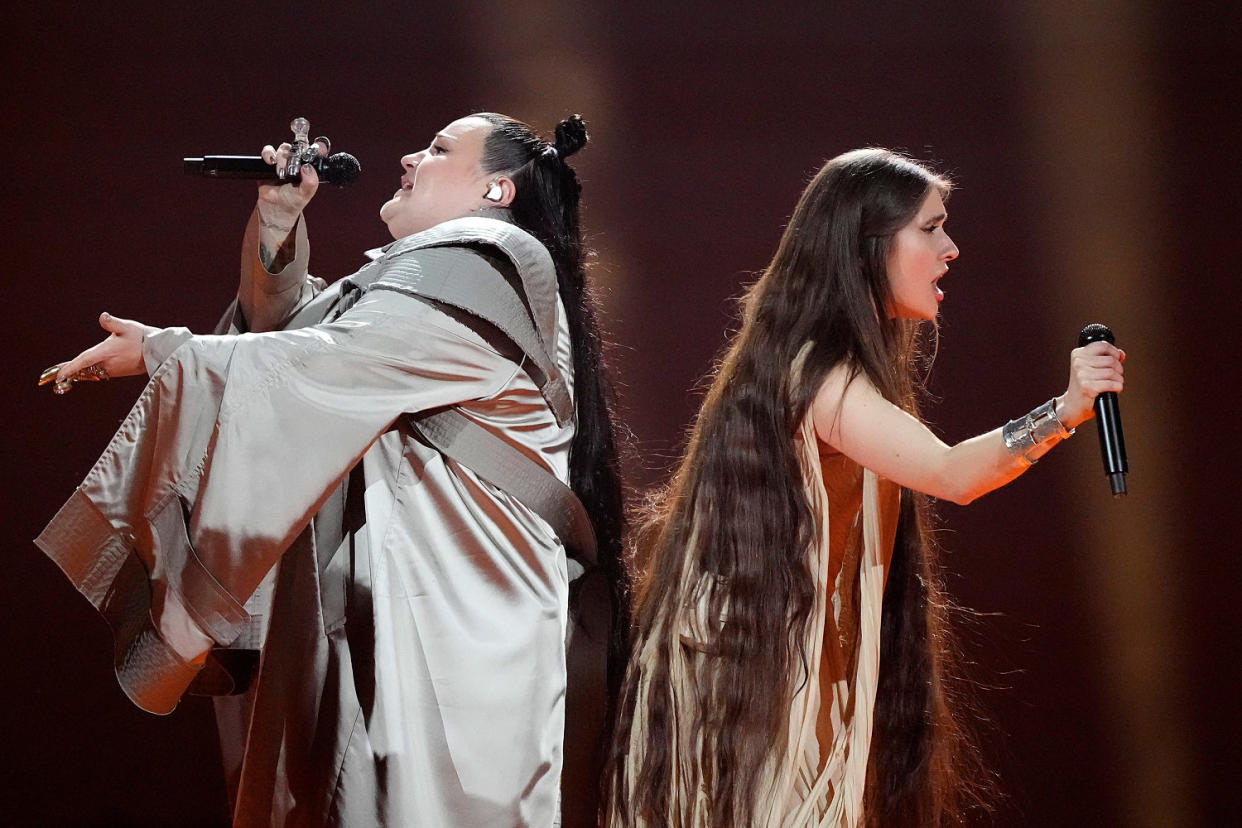Opinion | Ukraine's 2024 Eurovision duo reveals why the world can’t quit this competition

- Oops!Something went wrong.Please try again later.
- Oops!Something went wrong.Please try again later.
The Eurovision Song Contest is coming up on its 70th anniversary in a few years, but it’s only since the 2010s that the once Eurocentric event has become a true global phenomenon. The organizers have emphasized the sparkly, clubby extravaganza’s “safe” messages of peace and love and global togetherness. This year’s theme is literally “united by music.” But fans can tell you such posturing is mostly nonsense.
Eurovision isn’t successful because it’s apolitical; it’s successful because it is a safe outlet for politics. Its musical battles have been giving viewers a way to process their feelings about their neighbors for decades, whether it’s voting for Israel to win in 1978 after the invasion of Lebanon or handing the trophy to Yugoslavia in 1989 as the USSR teetered on the brink of collapse.
Now, in our post-“American Idol” reality show reality, this political release is available worldwide. Most of these countries cannot afford to fight wars, let alone win them without outside help, so expressing their displeasure over squabbles via voting on Europop is far more cost-effective.
In recent times, voters gave the U.K. zero points across the board the same year Brexit finally went into effect, and regularly shut out Germany, arguably because they hate the European Union tax standards set by the union’s largest player. But no country has been frustrated by the voters more than Russia. Russian artists have made it to many finals since their leaders invaded Ukraine in 2014 — only to be blocked from winning by low popular vote scores. The European Broadcast Union finally kicked the country out after the 2022 invasion of Ukraine.
And speaking of Ukraine, that nation’s act won in a landslide in 2022 — but not necessarily because of its entry. The war wasn’t over by the time the contest rolled around the next year, so runner-up U.K. hosted for Ukraine. (The winning country hosts the next year’s competition.) Ukraine politely submitted something completely non-war-related that had little chance of winning, a tactic nations have used in the past to avoid back-to-back wins, and the expensive logistics that come with them.
However, as the war continues, casualty counts rise on both sides and further aide for Ukraine falls out of favor with MAGA Republican lawmakers, Ukraine’s act has eschewed subtlety. Alyona Alyona and Jerry Heil’s “Teresa & Maria,” nominally about the Catholic saints and “hope,” features visuals that call to mind apocalyptic war. The song ends with both singers lying onstage among images of refugee mothers and babies, sleeping in a huddle for warmth. President Joe Biden might not watch Eurovision, but someone on his staff does. Ukraine’s delegation knows this show streams on Peacock.
Since winning a competition slot, Alyona and Heil have made appearances raising funds for Ukraine’s military and have vowed to sell their Eurovision trophy to help rebuild a school destroyed by a Russian missile. Ukraine isn’t the only country with the opportunity to use this year’s contest as an effective propaganda tool; Israel’s act, Eden Golan, somewhat surprisingly made it out of the semifinals as well. However Golan’s original song “October Rain,” an overt piece on the attacks, was deemed too obvious by Eurovision’s producers, and was reworked to become “Hurricane.” It now no longer includes any staging or lyrics that could be construed as pertaining to the ongoing conflict.
We shall see if global goodwill toward Ukraine will be enough to send its act back to the winner’s circle so soon after the nation’s 2022 win. Chances are many voters would prefer to vote for a different underdog this year, and the adorable (and talented) Baby Lasagna act from Croatia has been a huge hit.
Eurovision’s ability to tap into these political currents, even as the organizers continue to deny this reality, is a key reason why audiences tune in year after year to an extremely strange global soap opera. This time, it just so happens to include dancing cows and cats, a boy band made of identical twins, a paean to the E.U. overlords, a man in a mullet and Daisy Dukes spraying pyrotechnics, and a coded but fairly overt plea for war funding. No wonder we can’t quit this competition.
This article was originally published on MSNBC.com

